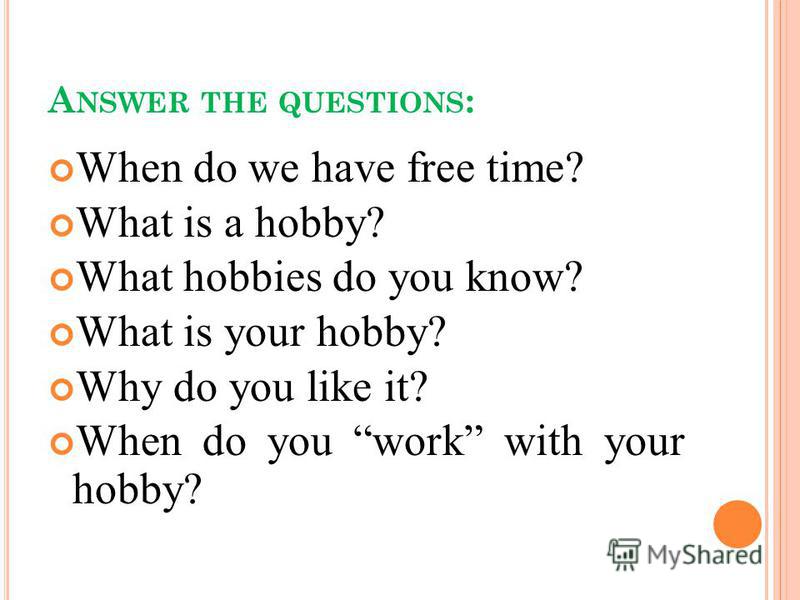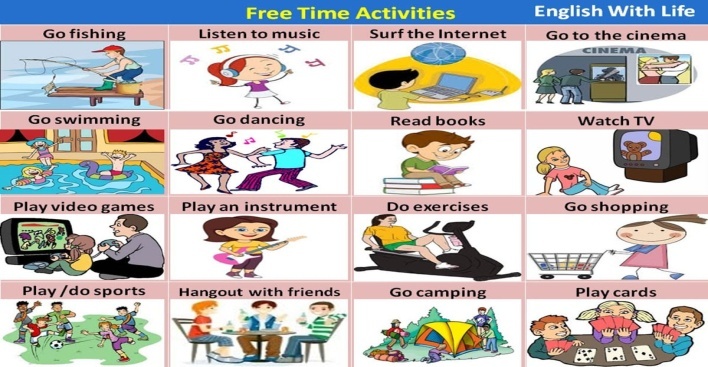
Short term plan
|
Unit:1 Hobbies and Leisure |
School: T.Bigeldinov |
|||||||
|
Date: |
Teacher’s name: Muldasheva G |
|||||||
|
Grade: 7 |
Number present: |
Absent- |
||||||
|
Theme of the lesson |
Discussion about hobbies and leisure activities |
|||||||
|
Learning objectives(s) that this lesson is contributing to |
7.C4 evaluate and respond constructively to feedback from others 7.S2 ask complex questions to get information about a limited range of general topics and curricular topics 7.L1 understand with little support the main points in extended talk on a limited range of general and curricular topics |
|||||||
|
Lesson obectives |
All learners will be able to:
Most learners will be able to:
Some learners will be able to:
|
|||||||
|
Assessment criteria |
|
|||||||
|
Value links |
“Mangilik Yel” Patriotic Act Value 2 – National unity, peace and harmony in our society. |
|||||||
|
Cross-curricular links |
Kazakh, Russian |
|||||||
|
Previous learning |
Grade 6th Hobbies and free time activities |
|||||||
|
Plan |
||||||||
|
Planned timings
|
Planned activities (replace the notes below with your planned activities) |
Resources
|
||||||
|
Start 5 min
5min
|
Organization moment Teacher greets students; students respond to greeting and take their places ‘‘The circle of joy’’ strategy All students stand in the circle and say compliments to each other, psychological mood at the lesson, the method helps learners create collaborative atmosphere in the class Method: “Magic box” Lets divide into two groups, take one of these cards in the box, who take the Present Simple tense sit here, who took the Present Continuous tense sit there Check up homework by method: “Throwing a ball”.
They will use to be keen on, Present Continuous tense and Present Simple tense and to talk about favorite hobbies. Brainstorming: I ask questions about their free time
|
Cards
Appendix1
|
||||||
|
Middle 5 min
10 min
10 min
|
Task 1. Pre-listening: Check the vocabulary by strategy “Key language”. Write on the board any words not already covered that you think your students may not know. Give each group one or two words to look up in their dictionary. Then have students explain the meaning of their words to the class. Help with understanding and give further examples where necessary. Key words: Swim, horror films, soap operas, fly, watching sport, see, play football
While-listening. Play the recording. Listen to two people talking about their free time. Are the sentences true (T) or false (F)? You will listen to the recording twice.
Post-listening Differentiation by type of the task Less able learners will listen twice and write true or false Example: Jack likes rock music. __T____ 1. Jack does not love watching sport._______ 2. Jack loves horror films. ________ 3. Jack sees his sister every week. _______ 4. Jenny likes Chinese food and Jack loves Mexican food. _______ 5. Jenny loves soap operas. _________ 6. Jenny likes flying _____ More able students have one chance to listen and complete the sentences with the correct form of the verbs in the box Listen to two people talking about their free time and complete the sentences with the correct form of the verbs in the box
not love, likes, loves, sees, likes, loves, likes
Descriptor: A learner
Group assessment: learners change their exercise books and check their work. Then evaluate with “tick and cross”.
Task 2. Speaking: “What should you do in your free time? ” Method: “Talk to neighbors” Differentiation by group abilities More able learners: Students will choose one picture and make up sentences without support Less able learners: translate the words in the picture and talk about it with some support or teacher’s support
Descriptor: A learner
AFL: The teacher will use such oral forms of formative assessment as “Well done!”, “Super!”, “Good!”. In this way the teacher encourages learners to actively participate in the lesson
|
Appendix2
73157cfb-80df-4912-ba76-3f814d1ad26b
|
||||||
|
End 5 min |
Concluding the lesson Feedback At the end of the lesson, students reflect on: I ask each group to assess the lesson with an activity ‘‘Pyramid’’ Teacher gives them picture card with pyramid. Learners must write your ideas about the lesson
Giving the home task. Find information about their admirable person and his or her hobby. They will share it with their classmates. |
Copybooks Feedback sheets |
||||||
|
Additional information |
||||||||
|
Differentiation – how do you plan to give more support? How do you plan to challenge the more able learners? |
Assessment – how are you planning to check learners’ learning? |
Health and safety check |
||||||
|
Differentiation by type of the task My less able learners will listen twice, but More able students have one chance to listen and complete the sentences with the correct form of the verbs in the box Differentiation by group abilities More able learners: Students will choose one picture and make up sentences without support Less able learners: translate the words in the picture and talk about it with some support or teacher’s support |
The teacher will use such oral forms of formative assessment as “Well done!”, “Super!”, “Good!”. In this way the teacher encourages learners to actively participate in the lesson. Therefore, during the lesson curried out group, peer and individual assessment were used using special assessment descriptor. Feedback ‘‘Pyramid’’ Teacher gives them picture card with pyramid. Learners must write your ideas about the lesson
|
Don’t swing the chair and run in the classroom
|
||||||
|
Reflection Were the lesson objectives/learning objectives realistic? Did all learners achieve the LO? If not, why? Did my planned differentiation work well? Did I stick to timings? What changes did I make from my plan and why?
|
Use the space below to reflect on your lesson. Answer the most relevant questions from the box on the left about your lesson |
|||||||
жүктеу мүмкіндігіне ие боласыз
Бұл материал сайт қолданушысы жариялаған. Материалдың ішінде жазылған барлық ақпаратқа жауапкершілікті жариялаған қолданушы жауап береді. Ұстаз тілегі тек ақпаратты таратуға қолдау көрсетеді. Егер материал сіздің авторлық құқығыңызды бұзған болса немесе басқа да себептермен сайттан өшіру керек деп ойласаңыз осында жазыңыз
Hobbies and leisere
Hobbies and leisere
Short term plan
|
Unit:1 Hobbies and Leisure |
School: T.Bigeldinov |
|||||||
|
Date: |
Teacher’s name: Muldasheva G |
|||||||
|
Grade: 7 |
Number present: |
Absent- |
||||||
|
Theme of the lesson |
Discussion about hobbies and leisure activities |
|||||||
|
Learning objectives(s) that this lesson is contributing to |
7.C4 evaluate and respond constructively to feedback from others 7.S2 ask complex questions to get information about a limited range of general topics and curricular topics 7.L1 understand with little support the main points in extended talk on a limited range of general and curricular topics |
|||||||
|
Lesson obectives |
All learners will be able to:
Most learners will be able to:
Some learners will be able to:
|
|||||||
|
Assessment criteria |
|
|||||||
|
Value links |
“Mangilik Yel” Patriotic Act Value 2 – National unity, peace and harmony in our society. |
|||||||
|
Cross-curricular links |
Kazakh, Russian |
|||||||
|
Previous learning |
Grade 6th Hobbies and free time activities |
|||||||
|
Plan |
||||||||
|
Planned timings
|
Planned activities (replace the notes below with your planned activities) |
Resources
|
||||||
|
Start 5 min
5min
|
Organization moment Teacher greets students; students respond to greeting and take their places ‘‘The circle of joy’’ strategy All students stand in the circle and say compliments to each other, psychological mood at the lesson, the method helps learners create collaborative atmosphere in the class Method: “Magic box” Lets divide into two groups, take one of these cards in the box, who take the Present Simple tense sit here, who took the Present Continuous tense sit there Check up homework by method: “Throwing a ball”.
They will use to be keen on, Present Continuous tense and Present Simple tense and to talk about favorite hobbies. Brainstorming: I ask questions about their free time
|
Cards
Appendix1
|
||||||
|
Middle 5 min
10 min
10 min
|
Task 1. Pre-listening: Check the vocabulary by strategy “Key language”. Write on the board any words not already covered that you think your students may not know. Give each group one or two words to look up in their dictionary. Then have students explain the meaning of their words to the class. Help with understanding and give further examples where necessary. Key words: Swim, horror films, soap operas, fly, watching sport, see, play football
While-listening. Play the recording. Listen to two people talking about their free time. Are the sentences true (T) or false (F)? You will listen to the recording twice.
Post-listening Differentiation by type of the task Less able learners will listen twice and write true or false Example: Jack likes rock music. __T____ 1. Jack does not love watching sport._______ 2. Jack loves horror films. ________ 3. Jack sees his sister every week. _______ 4. Jenny likes Chinese food and Jack loves Mexican food. _______ 5. Jenny loves soap operas. _________ 6. Jenny likes flying _____ More able students have one chance to listen and complete the sentences with the correct form of the verbs in the box Listen to two people talking about their free time and complete the sentences with the correct form of the verbs in the box
not love, likes, loves, sees, likes, loves, likes
Descriptor: A learner
Group assessment: learners change their exercise books and check their work. Then evaluate with “tick and cross”.
Task 2. Speaking: “What should you do in your free time? ” Method: “Talk to neighbors” Differentiation by group abilities More able learners: Students will choose one picture and make up sentences without support Less able learners: translate the words in the picture and talk about it with some support or teacher’s support
Descriptor: A learner
AFL: The teacher will use such oral forms of formative assessment as “Well done!”, “Super!”, “Good!”. In this way the teacher encourages learners to actively participate in the lesson
|
Appendix2
73157cfb-80df-4912-ba76-3f814d1ad26b
|
||||||
|
End 5 min |
Concluding the lesson Feedback At the end of the lesson, students reflect on: I ask each group to assess the lesson with an activity ‘‘Pyramid’’ Teacher gives them picture card with pyramid. Learners must write your ideas about the lesson
Giving the home task. Find information about their admirable person and his or her hobby. They will share it with their classmates. |
Copybooks Feedback sheets |
||||||
|
Additional information |
||||||||
|
Differentiation – how do you plan to give more support? How do you plan to challenge the more able learners? |
Assessment – how are you planning to check learners’ learning? |
Health and safety check |
||||||
|
Differentiation by type of the task My less able learners will listen twice, but More able students have one chance to listen and complete the sentences with the correct form of the verbs in the box Differentiation by group abilities More able learners: Students will choose one picture and make up sentences without support Less able learners: translate the words in the picture and talk about it with some support or teacher’s support |
The teacher will use such oral forms of formative assessment as “Well done!”, “Super!”, “Good!”. In this way the teacher encourages learners to actively participate in the lesson. Therefore, during the lesson curried out group, peer and individual assessment were used using special assessment descriptor. Feedback ‘‘Pyramid’’ Teacher gives them picture card with pyramid. Learners must write your ideas about the lesson
|
Don’t swing the chair and run in the classroom
|
||||||
|
Reflection Were the lesson objectives/learning objectives realistic? Did all learners achieve the LO? If not, why? Did my planned differentiation work well? Did I stick to timings? What changes did I make from my plan and why?
|
Use the space below to reflect on your lesson. Answer the most relevant questions from the box on the left about your lesson |
|||||||

шағым қалдыра аласыз





















